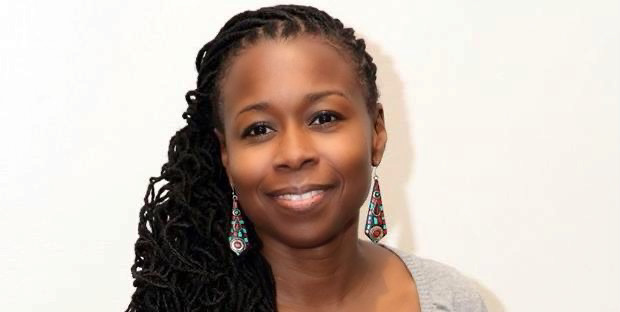
Source: Courtesy of TIME’S UP / Monifa Bandele
Following the “Open Letter in Defense of Black Survivors” released by the coalition last month, #MeToo, TIME’S UP, and the National Women’s Law Center are now doubling down on their effort to raise awareness about the unique experience Black survivors face. Speaking with Monifa Bandele, the Chief Operating Officer for the TIME’S UP Foundation, Madame Noire got the chance to hear about why “culturally competent care” is necessary now, how the erasure of Black survivor narratives puts them in further danger, and how the coalition’s new campaign, “We, As Ourselves” aims to help.
Towards the end of January, news broke that rapper Soulja Boy was being sued by his former assistant for allegedly putting her through years of physical and sexual abuse. Simultaneously, a number of women came out with reports of sexual abuse against rapper T.I. and his wife, “Tiny” Harris. With singer Raz B of B2K coming out as a survivor of sexual abuse around that same time, both celebrities and everyday people within the Black community were rocked by the devasting effects of sexual assault within recent months.
Using the events of this past January when the victims came out as an example, Bandele emphasized that the core of the problem that Black survivors face was plain as day. As she explained, because the experiences of white survivors have been prioritized in the media, the movement for justice in response to sexual assault overall has become pretty whitewashed. In essence, not only does it further discourage Black survivors of all backgrounds and genders to speak out, but it also highlights and promotes the more insidious problems within our “cultural framework,” that hinders Black survivors from getting the acknowledgment and care that they specifically need.
“We saw that at the same time survivors around Soulja Boy and T.I. and Tiny were speaking out and sharing their stories — there were white survivors sharing their stories that same weekend,” Bandele began. Speaking on how the narratives of Black survivors were erased in the mainstream coverage of the sexual assault allegations surfacing at that time, and how that erasure has the ability to negatively impact the Black community, Bandele continued, “We saw it play out right for us in the media, regarding who was valued, who was centered, whose stories trended. The message that that sends to folks in our community — women, girls, and men included — is that ‘Maybe you shouldn’t speak up. Maybe it’s not worth it to tell your truth and to tell your story.’”
Furthermore, the Chief Operating Officer said, “White survivors of assault have been at the forefront and central in the media’s depiction of who survivors are — not just for the last couple of years, but really for centuries. The entire way that our cultural framework sits here in the United States is around white women as victims, and a lot of times that’s actually weaponized in general against the Black community as a whole.”
Despite Black women being likely to face more assault, abuse, and sexual harassment than white women, Bandele emphasized that “the stories we see uplifted, centered, and portrayed in the media don’t reflect us.” As she explained, because they center around the stories and narratives of white women, Black women are continuously pushed into the dehumanizing space of being hyper-sexualized and criminalized in mainstream media but not seen or heard when they come out with reports of sexual abuse. As she said, “when you add those two things together — plus the erasure of the stories — it actually puts Black women in more danger because it blocks us from being able to get justice and accountability when we are harmed.”
With all that in mind, Bandele noted that the push for #MeToo, the TIME’S UP Foundation, and The National Women’s Law Center to join forces in their effort to support Black survivors was “a very natural coming together.” As she shared, despite the fact that Black women are often ignored or excused from conversations about sexual assault, they are the ones who make the conversations — and create spaces for them to grow and justice to occur.
“When we think about the movement,” she said, “Black women and Black women survivors actually have always been at the forefront of calls for justice, creating campaigns, building safe spaces, and doing systems of repair as it relates to the harm that women and gender non conforming folks have faced. Doubling down, she added, “What we want to do is really be intentional and put out as many conversations as possible that throws a marker in the grown saying Black women are leading this, Black women have always been leading this, have always been in the conversation, and we will no longer ignore Black survivors.”
Bandele shared that “We, As Ourselves” speaks to that mission. As a campaign specifically geared towards sharing the stories of Black survivors, in addition to sharing specifically culturally competent resources that are specific to them, the Cheif Operating Officer noted that the effort isn’t about “retraumatizing” survivors or forcing anyone to subscribe to the narrative that Black survivors are super strong, resilient, and numb to the harm that’s been done to them. As she explained, the new launch aims to be a platform where stories can be told, and healing can be found.
“‘We, As Ourselves’ isn’t just about centering these stories, but uplifting the voices of Black survivors — both men and women — to say we are worthy and deserving of care. Throughout this campaign,” she continued, “we’re going to be sharing resources about support steps survivors can receive, places where survivors can come together for collective healing, we’re going to celebrate black joy at every moment. It’s really a campaign that’s pulling on our cultural leanings, like how we care for one another, how we celebrate, how we express joy — while at the same time — making sure these stories are no longer hidden.”
“This is what ‘breaking the silence’ on another level looks like,” Bandele concluded. Speaking on how Black survivors stayed resilient despite the erasure of their narratives and never having the mainstream platform to share their experiences until now with “We, As Ourselves,” she added, “Black women have always been silence breakers — It’s just that no one was listening.”
To get more information and view the “We, As Ourselves” site, click here.


